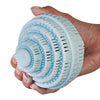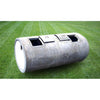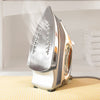Mini washing machines  come in handy in many situations. They can wash small loads, in apartments, RV’s and on boats. They can also be used for washing diapers, as you can keep them separate from other loads. They take up much less space than a regular washer, and don’t require a hookup. They normally use the kitchen faucet as the water source and the sink as the drain. They are 110V appliances and can plug into a regular outlet.
come in handy in many situations. They can wash small loads, in apartments, RV’s and on boats. They can also be used for washing diapers, as you can keep them separate from other loads. They take up much less space than a regular washer, and don’t require a hookup. They normally use the kitchen faucet as the water source and the sink as the drain. They are 110V appliances and can plug into a regular outlet.
Mini washers are completely different from the washing machines most people are used to. So it’s important to ask some key questions.
Does the company have any expertise in mini washing machines? How long have they been in business? Unlike big name brands, the quality can vary greatly. Sometimes the companies selling them are mainly marketers, rather than industry experts. That’s fine if buying and selling famous brand name products, but not when it comes to no-name mini washers. Most companies (ourselves included) tend to improve quality over time, as they gain expertise. You can contact the seller to see how well they know the products.
Ask about the expected lifespan and warranty. Many are built with cheap components that will in a short time. The products were often designed for markets where it costs nothing to repair, unlike North America. So with some of these units, even if you take excellent care of it, you can expect it to fail in a short period of time. In our experience some of the more expensive units with computer control panels last quite a bit longer. If you plan to use it on a regular basis, it may actually be cheaper to get one of these units, rather than buying 2 or more of the lower quality ones. If you are just using occasionally, i.e. for camping trips it’s not so important.
What is the real capacity? Many times capacity is overstated. You can ask for the dimensions of the inner tub, as that’s the most objective way to judge capacity. It’s very important to understand the capacity, to make sure it will fit your laundry needs and not require extra trips to the laundromat etc. For example if you want to wash larger items frequently, you’ll want to get one of the larger capacity mini washers.
Is there a spin cycle? Currently no mini washing machines have this function. It’s important to understand that the clothes are going to come out wet. You can either wring them by hand, use a spin dryer to remove the excess water, or just hang them up wet to dry.
Is there a rinse cycle? Only mini washers with a computer control panel have this feature. Without this feature, you have to manually intervene and add water to the machine. You also have to stand by to make sure it doesn’t overflow, in other words, you can expect to “babysit” the machine. So if you are looking to save time, it’s better to spend a little more and get a unit with an automatic rinse cycle.
Does it have Inlet hoses? If so, what kind? Some units require you to add water manually. Other units have cheap plastic inlet hoses, which are often not compatible with your faucet type. The most convenient type of inlet hoses use a quick connect faucet adapter. With this type of inlet hoses, you can quickly connect the hose each time, and the connection is stronger than with cheaper inlet hoses. This type of inlet hose is more expensive to make and as a result not always provided.
Does it have a pump? Most mini washers do not, but a couple do. If it doesn’t have a pump, you’d normally want to use it on a countertop. In this case it’s helpful to measure and make sure it fits on the countertop. If it has a pump, you can use it on the floor or the countertop, assuming the drain hose is long enough.
How long are the hoses and power cord? You want to make sure they are long enough for the space where you intend to use the machine.
How dirty are your clothes? Most mini washers only have one cycle, unlike conventional washing machines. Some mini washers wash the clothes cleaner than others, but at the same time can be rougher on the clothes. In general most (not all) mini washing machines tend to be a little rougher on the clothes than conventional washers. One reason is that except for the Eco-Egg mini washer and the non-electric Wonderwash, they use impellers. Impellers are more common in Asia, and have some advantages such as taking up less space and offering a larger washing capacity. On the other hand, because they spin faster and don’t separate the clothes like agitators do, they can be rougher on the clothes as there is more tangling and friction. So, depending on the unit you purchase, it’s not a bad idea to use a mesh bag for delicate items. You can also turn some clothes inside out to minimize the risk.
What are the dimensions? It’s not a bad idea to measure before you buy. It might seem obvious, but quite a few people return these units because they say they are too large or small for their needs.
What about parts availability and shipment time? Some companies might not have spare parts, or take 4-6 weeks to ship them.













